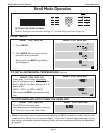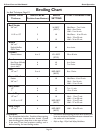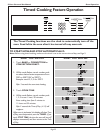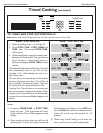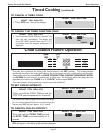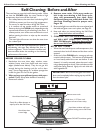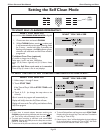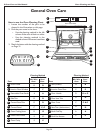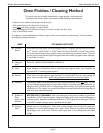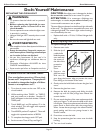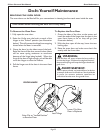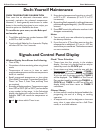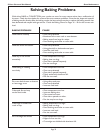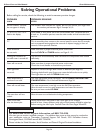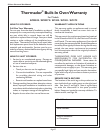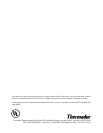
S Oven Care and Use Manual Oven Maintenance
Solving Baking Problems
With either BAKE or CONVECTION, poor results can occur for many reasons other than a malfunction of
the oven. Check the chart below for causes of the most common problems. Since the size, shape and material
of baking utensils directly affect the baking results, the best solution may be to replace old baking utensils that
have darkened and warped with age and use. Check the Baking Charts on Pages 16 – 18 for the correct rack
level.
BAKING PROBLEM CAUSE
Food browns unevenly • Oven not preheated.
• Aluminum foil on oven rack or oven bottom.
• Baking utensil too large for recipe.
• Pans touching each other or oven walls.
Food too brown on bottom • Oven not preheated.
• Using glass, dull or darkened metal pans.
• Incorrect rack level.
• Pans touching each other or oven walls.
Food dry or has shrunk • Oven temperature too high.
excessively • Baking time too long.
• Oven door opened frequently.
• Pan size too large.
Food baking or roasting • Oven temperature too low.
too slowly • Oven not preheated.
• Oven door opened frequently.
• Tightly sealed with aluminum foil.
• Pan size too small.
Pie crusts don't brown on bottom • Using shiny steel pans.
or have soggy crust • Oven not preheated.
• Incorrect rack level.
Cakes pale, flat and may • Oven temperature too low.
not be done inside • Incorrect baking time.
• Cake tested too soon.
• Oven door opened too often.
• Pan size may be too large.
Cakes high in middle with • Baking temperature too high.
crack on top • Baking time too long.
• Pans touching each other or oven walls.
• Incorrect rack level.
• Pan size too small.
Pie crust edges too brown • Oven temperature too high.
• Edges of crust too thin.
• Crust edge not shielded with aluminum foil.
Page 35



